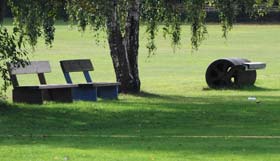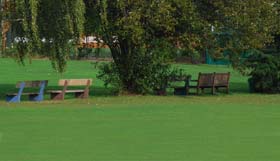
CONTENTS
1. Role of a trustee
2. Trustee eligibility
3. Trustees’ Code of Conduct
4. Rules of business
5. Financial rules
6. Trust officers’ roles
7. Conflict of interest policy
1. THE ROLE OF A SHEPHERDS COT TRUSTEE
1. The Shepherds Cot Trustee Board is collectively responsible for establishing the essential purposes of Shepherds Cot and trustees are responsible for safeguarding its ethos and values.
2. Together, trustees and the senior members of the three constituent sports clubs develop long-term strategy. Trustee meeting agendas reflect the key points of the strategy to keep Trust business on track.
3. Trustees create policies to govern organisational activity. These cover:
• Conduct of trustees and board business
• Ultimate policy-making responsibility.
4. Trustees recruit and select new trustee board members after consultation with the clubs.
5. Trustees make sure the rules of business are followed. In particular the activities must comply with the three clubs’ objectives.
6. Trustees are responsible for checking that all the organisation’s activities are legal.
7. Shepherds Cot Trustees fulfil their accountability as required by law to:
• Fields in Trust
• HM Revenue and Customs
• ECB and LTA
• Our three Member Clubs
• Their Tenants and Leasholders
They are also accountable to:
• Donors and funders
• Beneficiary clubs
• Members
• Stakeholder and volunteers
• The general public
8. Trustees are responsible for effectively managing Shepherds Cot’s resources so it can meet its objectives. This means:
• Monitoring spending in the best interests of the organisation
• Approving the annual accounts and budgets
• Protecting Shepherds Cot against liability by providing insurance
• Seeking to minimise risk for the organisation
• Participating in fundraising
• Ensuring legal compliance
9. Trustees manage the organisation’s business by engaging in:
• Productive meetings
• Effective committees with adequate resources
• Development activities
• Regular performance reviews
• Partnership with consultants where necessary
10. Through their governance oversight and activities on behalf of Shepherds Cot, trustees enhance and protect its reputation. They are good ambassadors for Shepherds Cot and adhere to the Trust’s Code of Conduct.
2. ELIGIBILITY OF SHEPHERDS COT TRUSTEES
The Shepherds Cot Trust is not a charity but the principles below are agreed to apply to all its trustees.
1. Age
Under charity law, a person must be aged 18 or over to serve as a charity trustee. Note that under the 1993 Charities Act, the legal definition of a charity trustee is a person having the general control and management of the administration of a charity.
2. Personal Solvency
Under charity law, a person is disqualified from acting as a charity trustee if he/she:
is an undischarged bankrupt or
is subject to an order for composition or arrangement with her/his creditors under the Insolvency Act 1986 and the order has not yet been discharged
is subject to an Insolvency Act Order for failing to make payments under an administration order is also disqualified, unless s/he has been specifically cleared to be a trustee by the Court that made the Order.
3. Criminal Record
A person is disqualified from being a charity trustee if s/he has been convicted of a criminal offence involving dishonesty or deception which has not been spent under the Rehabilitation of Offenders Act 1974. NB: If the sentence on conviction for the offence was imprisonment (even if suspended) for 2½ years or more, then that person is disqualified for life. A person is disqualified from being a trustee of a children’s charity if s/he has been disqualified from working with children under Criminal Justice and Courts Services Act 2000.
4. Removal Orders
Charity trustees who have been removed as company directors by the High Court or as trustees by the Charity Commission are disqualified from acting as company directors and/or charity trustees.
5 Company Directors Disqualification Act 1986
Company directors cannot act as directors or charity trustees while disqualified by the Court under this Act. Directors can be disqualified for:
5.1 general misconduct i.e.
5.1.1 persistently failing to file accounts and returns
5.1.2 conviction on indictment in relation to the formation. management or liquidation of a company
5.1.3 fraudulent trading resulting in the winding up of a company
5.2 unfitness to manage i.e.
5.2.1 being involved in an insolvent company that has since wound up
5.2.2 because the Court declares the person unfit for other reasons
3. SHEPHERDS COT BOARD OF TRUSTEES’ CODE OF CONDUCT
Trustees of Shepherds Cot promise to abide by the fundamental values that underpin all the activity of this organisation. These are:
A Accountability
Everything the Trust does will be able to stand the test of scrutiny by the public, the media, charity regulators, members, stakeholders, funders, parliament and the courts.
B Integrity and honesty
These will be the hallmarks of all conduct when dealing with colleagues within Shepherds Cot Trust and equally when dealing with individuals and institutions outside it.
C Transparency
Shepherds Cot Trust strives to maintain an atmosphere of openness throughout the organisation to promote confidence of the public, stakeholders, staff, charity regulators and parliament.
Additionally, every trustee agrees to the following:
1. Law, mission, policies
1.1 I will not break the law or go against charity regulations in any aspect of my role of trustee.
1.2 I am not disqualified by law from acting as a charity trustee or a company director and I will sign an annual declaration that I continue to be eligible to act as a trustee
1.2 I will support the mission and consider myself its guardian.
1.3 I will abide by organisational policies.
2. Conflicts of interest
2.1 I will always strive to act in the best interests of the organisation.
2.2 I will declare any conflict of interest, or any circumstance that might be viewed by others as a conflict of interest, as soon as it arises.
2.3 I will submit to the judgment of the board and do as it requires regarding potential conflicts of interest.
3. Person to person
3.1 I will not break the law, go against charity regulations or act in disregard of organisational policies in my relationships with fellow trustees, staff, volunteers, members, service recipients, contractors or anyone I come into contact with in my role as trustee.
3.2 I will strive to establish respectful, collegial and courteous relationships with all I come into contact with in my role as trustee.
4. Protecting the organisation’s reputation
4.1 I will not speak as a trustee of this organisation to the media or in a public forum without the prior knowledge and approval of the chair or secretary.
4.2 When I am speaking as a trustee of this organisation my comments will reflect current organisational policy even when these do not agree with my personal views
4.3 When speaking as a private citizen I will strive to uphold the reputation of the organisation and those who work in it.
4.4 I will respect organisational, board and individual confidentiality.
4.5 I will take an active interest in the organisation’s public image, noting news articles, books, television programmes and the like about the organisation, about similar organisations or about important issues for the organisation.
5. Personal gain
5.1 I will not personally gain materially or financially from my role as trustee, nor will I permit others to do so as a result of my actions or negligence.
5.2 I will document expenses and seek reimbursement according to procedure.
5.3 I will not accept substantial gifts or hospitality without prior consent of the board.
5.4 I will use organisational resources responsibly, when authorised, in accordance with procedure.
6. In the boardroom
6.1 I will strive to embody the principles of leadership in all my actions and live up to the trust placed in me by the organisation.
6.2 I will abide by board governance procedures and practices.
6.3 I will strive to attend all board meetings, giving apologies ahead of time to the chair if unable to attend.
6.4 I will study the agenda and other information sent me in good time prior to the meeting and be prepared to debate and vote on agenda items during the meeting.
6.5 I will honour the authority of the chair and respect his or her role as meeting leader.
6.6 I will engage in debate and voting in meetings according to procedure, maintaining a respectful attitude toward the opinions of others while making my voice heard.
6.7 I will accept a majority board vote on an issue as decisive and final.
6.8 I will maintain confidentiality about what goes on in the boardroom unless authorised by the chair or board to speak of it.
7. Enhancing governance
7.1 I will participate in induction, training and development activities for trustees.
7.2 I will continually seek ways to improve board governance practice.
7.3 I will strive to identify good candidates for trusteeship and appoint new trustees on the basis of merit.
7.4 I will support the chair in his/her efforts to improve his/her leadership skills.
7.5 I will support the secretary and treasurer in his/her executive role and, with my fellow board members, seek development opportunities for him/her.
8. Leaving the board
8.1 I understand that substantial breach of any part of this Code of Conduct may result in my removal from the trustee board.
8.3 Should I resign from the board I will inform the chair in advance in writing, stating my reasons for resigning. Additionally, I will participate in an exit interview.
4. SHEPHERDS COT TRUST RULES OF BUSINESS
Trustee responsibilities
1. Hold property in trust for the member clubs.
2. Transfer or deal with such property as directed by the member clubs.
3. Support member clubs as far as possible in seeking improvements and developments to the clubs’ sporting facilities.
4. Operate at all times for the benefit of member clubs.
5. Operate as a financially responsible organisation, committed to best use of its assets for the mutual benefit of all member clubs.
6. Maintain the common parts.
7. Individually to communicate to the trustees the views and wishes of their member clubs but collectively to act in the best interests of all the beneficiaries.
8. To assist member clubs on matters of fact with respect to leases and inter-club issues.
Trustee powers
1. Grant leases to member and tenant clubs and ensure compliance with those leases.
2. Collect contributions, rents and service charges as they fall due.
3. Incur expenditure to maintain the common parts.
4. To enter into contracts with service providers and tenants.
Trustees
1. There will be 8 trustees.
2. Trustees are nominated by the member clubs, with equal numbers from North London Cricket Clun and Highgate Lawn Tennis and Cricket Club and the balance from Hanley Lawn Tennis Club i.e. 3,3,2 respectively.
3. Trustees are appointed and removed by deed. An appointed trustee may resign, or be removed at the request of their nominating club or by trustees acting in accordance with the ‘special business’ voting rules.
4. A trustee is appointed for an initial five years. At the end of that term the nominating club will be asked if they wish to nominate a new trustee or re-nominate the existing trustee.
5. Trustees are nominated by their clubs and act as a conduit for their clubs views and wishes, but in undertaking trustee business must act in the best interests of all beneficiaries.
6. The trustees will appoint from amongst themselves an honorary chairman, honorary secretary and honorary treasurer. The chairman and the secretary will be from different member clubs.
7. No payments will be made to any trustee, or any member of any committee established by the trustees, in respect of exercising their duties.
Trustee meetings
1. Trustee meetings are held as necessary but at least once a quarter. 14 days’ notice is required.
2. Trustee meeting minutes will be circulated in draft to trustees within 14 days and to member club secretaries within 28 days, and will be approved at the next trustee meeting.
3. A permanent record will be held of all trustee meetings.
4. Trustee meeting are quorate when a trustee from each club is present.
5. Trustees will declare any conflict of interest they may have, other than any standing conflict deemed to arise from membership of a member club.
6. Trustees will hold an Annual General Meeting open to all members of member clubs, giving 28 days’ notice. Matters for the agenda must be submitted 14 days before the meeting.
7. Extraordinary General Meetings may be called at 42 days’ notice by the trustees or by the secretary of any member club acting on the instruction of their club committee. Matters for the agenda must be submitted 28 days before the meeting.
Voting
1. Decisions are reached by simple majority, except for ‘special business’.
2. Where voting results in a tie, the chairman will not have a casting vote and the status quo ex ante will prevail.
3. The first category of ‘special business’ is any sale or lease of land. This requires the unanimous decision of all trustees.
4. The second category of ‘special business’ includes; registering a charge against the land, seeking, or granting permission to seek, planning permission, changes to member club annual contributions towards the running costs of the Trust, changes to rents, and expenditure in excess of a specified amount (to be determined from time to time). This requires the support of one trustee from each member club.
5. The third category of ‘special business’ is the enforced removal of a trustee, which requires the support of five trustees.
5. SHEPHERDS COT TRUST FINANCIAL GUIDELINES
Trustee monies
1. The trustees will establish appropriate banking facilities for the receipt, holding and disbursement of funds. These will be documented together with appropriate spending and payment authorisation controls (including ‘special business’ levels) and appropriate procurement guidelines.
2. Trustees must declare any potential conflict of interest in respect of procurement or the provision of paid services.
3. Bank statements will be sent to two trustees.
4. The trustees will arrange for appropriate accounting records to be kept and examined annually by an independent assessor. These will be circulated to the member clubs. All accounting records will be retained for a minimum of seven years.
5. Funds may only be disbursed to the benefit of the Trust itself, or that of member clubs.
6. All cheques must be signed by two trustees.
7. The Trustees will hold surplus funds against future disbursements or contingencies. If the Trustees consider that any surplus is in excess of likely future disbursements contingencies they will consult with the member clubs on how to deal with such an excess.
Specific guidelines
1. Spending limits (other than for utility bills):
Up to £500: to be authorised by any two trustees (no more than 4 times in any financial year. by the same two trustees) and reported to and minuted by the trustee board ex post.
£500 – £2500: to be authorised and minuted by the trustee board ex ante.
Over £2500: subject to the second category of ‘special business’ rules.
All expenditure to be properly invoiced and receipts preserved.
2. Procurement guidelines:
Up to £500: at the discretion of the authorising trustees.
£500-£2500: at least one estimate to be provided to the trustee board, which will consider whether it is appropriate to seek a second estimate.
Over £2500: at least two estimates to be obtained, unless the trustees agree under the second category of ‘special business’ rules that this is inappropriate.
6. ROLES OF OFFICERS
Chair
1. Scrutinise board papers and prepare for each meeting
2. Lead discussions
3. Focus on key issues
4. Provide guidance on new initiatives
5. Provide guidance on other issues in which the Trust has special expertise.
6. Plan the annual cycle of board meetings
7. Set agendas for board meetings with the secretary
8. Chair and facilitate board meetings
9. Give direction to board policy-making
10. Ensure that decisions taken at meetings are implemented
11. Represent the organisation at functions and meetings
12. Act as a spokesperson as appropriate
13. Bring impartiality and objectivity to decision-making
14. Ensure that Trust archives are preserved
The secretary acts for the chair when the chair is not available and undertakes assignments at the request of the chair.
Secretary
The general role of the Trust secretary is to support the chair by ensuring the smooth functioning of the board. Either personally or by delegation, the secretary should:
1. Receive agenda items from other trustees
2. Prepare agendas in consultation with the chair
3. Circulate agendas and supporting papers in good time
4. Make arrangements for meetings:
5. Booking the room
6. Equipment
7. Refreshments
8. Facilities for those with special needs
9. Check that a quorum is present
10. Minute the meetings and circulating the draft minutes to all trustees
11. Ensure that the minutes are signed by the chair once they have been approved
12. Check that trustees have carried out action agreed at a previous meeting
13. Circulate agendas and minutes of the Annual General Meeting and any Special or Extraordinary General Meetings
Treasurer
1. Maintain an overview of the organisation’s affairs so as to ensure its financial viability and that proper financial records and procedures are maintained.
2. Oversee approving and presenting budgets, accounts and financial statements
3. Be assured that the financial resources of the organisation meet its present and future needs
4. Ensure that the Trust has an appropriate reserves policy
5. Prepare and present financial reports to the board
6. Ensure that appropriate accounting procedures and controls are in place
7. Liaise with any paid contractors and volunteers about financial matters
8. Advise on the financial implications of the organisation’s strategic plans
9. Ensure that the Trust has an appropriate investment policy
10. Ensure that there is no conflict between any investment held and the aims and objects of the Trust
11. Monitor the Trust’s investment activity and ensuring its consistency with the Trust’s policies and legal responsibilities
12. Ensure the Trust’s compliance with finance, tax and similar legislation
13. Ensure equipment and assets are adequately maintained and insured
14. Ensure that the accounts are prepared and disclosed in the form required by funders and the relevant statutory bodies
15. If external scrutiny of accounts is required, ensure that the accounts are scrutinised in the manner required (independent examination or audit) and any recommendations are implemented
16. Keep the board informed about its financial duties and responsibilities
17. Contribute to the fundraising strategy of the Trust
18. Make a formal presentation of the accounts at the Annual General meeting and drawing attention to important points in a coherent and easily understandable way
19. Sit on appraisal, recruitment and disciplinary panels as required
7. CONFLICTS OF INTEREST POLICY AND PROCEDURE
1.0 Preliminary Note:
Guidance on the law and practice relating to conflicts of interest for charity trustees can be found in the Charity Commission’sguidance
2.0 The principles
2.1 Trustees have both a legal and a moral obligation to act in the best interests of the Trust and its beneficiaries (present and future) and in accordance with the relevant Code of Conduct.
2.2 Trustees need therefore to be sensitive to the possibility that their activities outside the Trust (including holding office or being otherwise employed by or involved in organisations, companies or political parties) could be perceived as having a bearing on – or coming into conflict with – the objects and integrity of the organisation.
2.3 Conflicts of interest may arise where an individual trustee’s personal or family interests and/or loyalties conflict with those of the charity. Such conflicts may create problems; they can:
• inhibit free discussions;
• result in decisions or actions that are not in the interests of the charity; and
• risk the impression that charity or the trustee has acted improperly.
The aim of this policy is to protect both the organisation and the individuals involved from any appearance of impropriety.
2.4 Trustees have a duty in law to avoid conflicts of interest and must not take part in any discussion or decision in which there is such a conflict.
2.5 A conflict of interest arises
2.5.1 where a trustee or person connected with her/him (see 2.8 below) has a material interest in or stands to gain financially from any decision of the Trust or,
2.5.2 Where the trustee has an interest or position outside the Trust which is or may be in actual or potential conflict with their position as a trustee even though there is no possibility of financial gain.
2.6 An example of a potential conflict of interest is where a Trustee (or an organisation in which he/she has an interest) may be tendering/or considering to tender for a contract where it known that Shepherds Cot Trust is also tendering for the same contract. In such circumstances, a conflict of interest should be declared and the trustee should follow procedures described at point 3.
2.7 At the start of each trustee board meeting, members should declare whether any agenda items raise a potential conflict of interest. This will be recorded and minuted. From that point onwards, if a matter arises where a trustee has declared an interest, then the procedure under 3 below must be followed.
2.8 Where it is decided at a meeting to enable a trustee to obtain a personal benefit from the organisation (and thereby put that trustee in a position of a potential conflict of interest), then the procedure under 3.2 below must be followed.
2.9 * a person connected with a trustee is:
2.9.1 a child, parent, grandchild, grandparent, brother, sister or spouse of the trustee or any person living with the trustee as his or her partner
2.9.2 a business partner or co-owner of a business of which the trustee is an owner
3.0 Procedure in dealing with trustee benefits and conflicts of interest
3.1 Any trustee (or any firm or company of which a trustee is a member or employee) may enter into a contract with the trust to supply goods or services in return for a payment or other material benefit but only if
3.1.1 the goods or services are actually required by the Trust
3.1.2 the nature and level of the remuneration is no more than is reasonable in relation to the value of the goods or services and is set in accordance with the procedure in paragraph 3.2
3.1.3 no more than one half of the trustees are subject to such a contract in any financial year.
3.2 Whenever a trustee has a personal interest in a matter to be discussed at a meeting of the trustees or a sub-committee the trustee concerned must:
3.2.1 declare an interest at or before discussion begins on the matter
3.2.2 withdraw from the meeting for that item unless expressly invited to remain in order to provide information
3.2.3 not be counted in the quorum for that part of the meeting
3.2.4 withdraw during the vote and have no vote on the matter.
3.3 If a trustee has any interest in the matter under discussion which creates a real danger of bias: that is, the interest affects her/him, or a member of her / his household, more than the generality affected by the decision, s/he should declare the nature of the interest and withdraw from the room, unless he / she has a dispensation to speak.
3.4 If a trustee has any other interest which does not create a real danger of bias, but which might reasonably cause others to think it could influence their decision, s/he should declare the nature of the interest, but may remain in the room, participate in the discussion, and vote if s/he wishes.
3.5 If in any doubt about the application of these rules s/he should consult with the chair.
3.6 All decisions under a conflict of interest will be recorded in the minutes of the meeting. The report will record:
• The nature and extent of the conflict;
• An outline of the discussion;
• The actions taken to manage the conflict.
3.7` Whenever possible, there should be competitive tendering for contracts or work for which a trustee might be suited and references from other clients or customers should be taken up.
3.8 Shepherds Cot Trust register of trustees’ interests is located in the Trustee Manual. This document is available upon request from the Trust chair.







